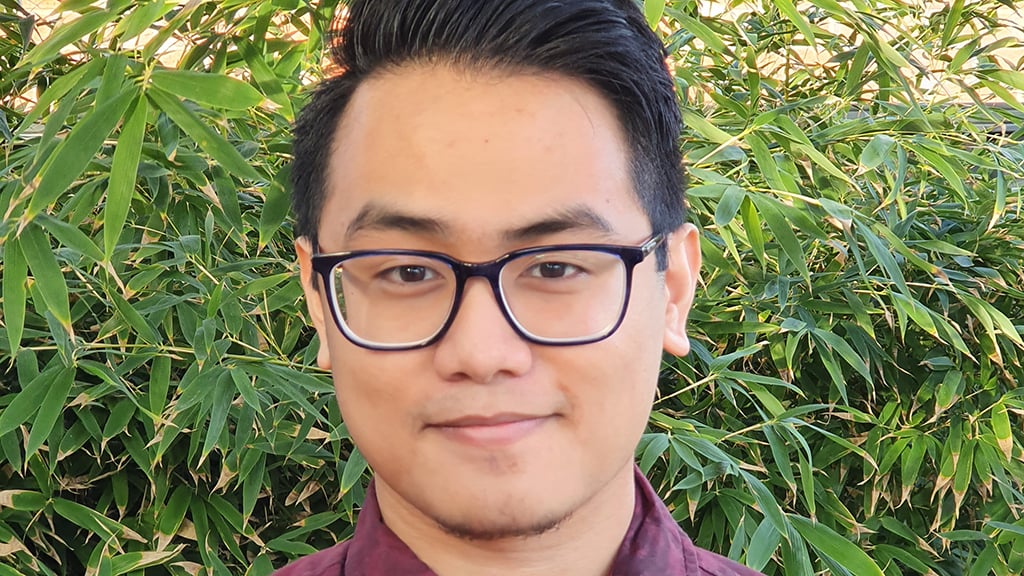How Nathan improved his grades and found study–life balance
Do you ever find it hard to manage stressful situations; worry about how the uncertainty of COVID-19 may affect your wellbeing; or struggle with assignments, personal problems or your mental health?
You’re not alone – many of your peers are likely feeling the same way or wondering how to cope.
Nathan Bucud is a second-year Bachelor of Science (Genetics) student who knows what it’s like to feel overwhelmed at times. But he wants you to know that there’s some simple steps you can take to look after yourself – and that talking about how you’re feeling is crucial.
Based at Waurn Ponds, Nathan is actually doing his second degree – he’s also completed a Bachelor of Biomedical Science at Deakin. And it was during this first experience as a uni student that he started to struggle with the pressures of study:
I was a typical student and took four units each trimester, which was too much. If I could go back in time I’d do three or even two units. But instead of taking a break I pushed on. The side effect of this was that my grades started to suffer massively. So I decided to seek help.
Nathan discovered Deakin’s free counselling service and was brave enough to give it a try, even though he had some reservations:
I was worried beforehand that I wouldn’t connect with the counsellor but it was a really good experience. The counsellor went through different scenarios for how I could improve my situation and helped me to place a greater emphasis on my emotional health.
He also sought out other support services such as Beyond Blue, and found these to be of enormous benefit. One of the most important things he learnt is that ‘when push comes to shove, it’s so important to detach and take a breather’.
And, he says, his grades improved markedly as a result of a better study–life balance.
Nathan also emphasises the importance of overcoming the stigma around mental health, and to make it normal for men in particular to talk about how they’re feeling.
When chatting to his mates, he was surprised to learn that some of them had also used Deakin’s counselling service. They agreed that talking to a professional and learning new ways of coping really helped them to manage all the aspects of uni life.
Nathan’s tips for study–life balance
- Consider taking some units in Trimester 3 to spread out your course load – chat to a Student Adviser at Student Central first to ensure you’re following your course map.
- Use the great range of Study Support available at Deakin – Nathan is a particular fan of PASS and Writing Mentors, as he finds it easier to connect with students around his age.
- Join DUSA clubs to meet people – if you find it harder to connect with people online, Nathan says you can’t beat the social opportunities that come from the huge range of clubs and societies on offer.
- Get away from the pressures whenever you start to feel overwhelmed – Nathan, who lives near the You Yangs, finds it beneficial to get out into nature and go for a hike to reset. He says this is especially important during online learning when he finds it even harder to disconnect from study.
- Talk it out – whether it’s to a trusted friend or a professional counsellor, Nathan says that sharing how you’re feeling is the first step to making positive changes. Connecting with your counsellor is vital, so try a few different people if you’re not totally comfortable with your first experience.
How to access support
A range of help is available, both at Deakin and in the community:
- Talk to one of our student mental health experts by making a telehealth appointment with Deakin’s Counselling and Psychological Support (CAPS) service. You can access up to six free telehealth appointments, so book online now.
- If you’re not ready to talk one-on-one, check out our Ask Counselling blog – it’s a collection of anonymous student questions that have been answered by Deakin counsellors. Search by topic or submit your own question for a tailored reply.
- Explore our eWellbeing Hub. This collection of informative and practical articles and apps will help you stay healthy, motivated, in control and happy while you’re studying.
- headspace, VicHealth and Beyond Blue have some great articles and resources on improving your wellbeing, while this self-care planning fact sheet and template from the Black Dog Institute outlines some simple steps to get you in a good headspace.
- For urgent support outside of business hours, contact LifeLine (13 11 14) or SuicideLine (1300 651 251) straight away. They’re available 24 hours a day, seven days a week. In an emergency, call Triple Zero (000).
